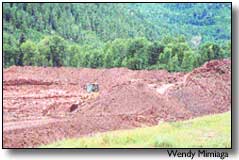|
Aug 4, 2001
By Jim Mimiaga Although the controversial Line Camp gravel mine northeast of Dolores has begun operations, controversy lingers over its approval. Opponents of the large-scale sand-and-gravel operation located adjacent to the Dolores River have filed for a reconsideration hearing with the same board that approved the mine in May. The hearing is set for Aug. 23 in Denver. Objectors Dave Wuchert and Jim Preston, attorney for Line Camp neighbors Carol Stepe and Jack Akin, claim the Colorado Mined Land and Reclamation board failed to adequately consider environmental impacts such as water quality, and did not follow state rules regulating mine permitting. Wuchert and Preston suspect that mercury build-up, which can be toxic to humans, native fish and riparian ecosystems, has occurred in alluvial river sources targeted for gravel-mining, but say the issue was ignored by the board. "The mercury issue in the river has been concealed, and they do not want it to explode," Wuchert said. "My concern is that the witnesses from the Water Quality and Control Division were not subpoenaed during the hearing to testify on possible health risks." Environmentalists worry that mercury collects in the alluvial regions being mined for gravel. When those regions are disturbed, it sends the toxin into McPhee Reservoir, where it settles into silt, "but we need water-quality officials to testify to that potential under oath, and they were not subpoenaed at our request even though thatís the responsibility of the board," Wuchert said. A recent EPA study blamed documented mercury contamination in McPhee Reservoir on unmaintained mine-tailing ponds near Rico. But the issue has not been adequately studied in-stream and was not considered at the original hearings approving the mine, objectors claim. Wuchert conceded that the chances for a re-hearing "are slim," adding that though the appeal is a necessary step, additional action could be taken. "Suing the federal government for violating the Clean Water Act is a procedure we will look into if the attention this matter deserves does not get heard at the state level," he said. "We believe that the state agencies have a taxpayer and legal responsibility to test for toxic-mineral contamination resulting from mining near rivers." In filing the Stepe and Akin reconsideration petition, Preston cried foul when an investigation launched by Gov. Bill Owens to study the matter landed with the Mined Land Reclamation office, which advocates for mining. The study had originally been assigned to the Colorado Geological Survey, considered to be a more independent agency, he said. But a bill passed by the General Assembly giving the Geological Survey more autonomy by separating it from the Natural Resources Department was vetoed by Owens. The gravel study was then reassigned to the Mined Land Reclamation Board. "In other words the fox is now guarding the hen house," Preston said. "And I think the public needs to be aware of this." The case also got the attention of Rep. Mark Larson (R-Cortez). In July, Larson convinced the Montezuma County commissioners to work with the state water board on a preliminary flood-plain study in the upper Dolores River Valley. A short flooding study conducted by the Army Corps of Engineers in the late 1970s on the Dolores is relied on by mining-permit agencies, but the data may need to be updated, Larson said. The Line Camp Pit, operated by Four States Aggregate, has become a landmark case symbolizing the conflict between the pervasive demand for construction gravel and the need to protect natural areas from over-development. Critics argue that more state regulation is needed to better monitor the cumulative effects numerous mines have within a short section of a river, such as in the upper Dolores River Valley. Currently state statutes only require proposed mines to be considered on their individual merits. But without alternatives to gravel, supporters say there is no other way to meet the huge construction demands of Coloradoís booming population. Furthermore, the high-grade sand and gravel needed for making cement can only be found in river plains. A spokesman with the Mined Land Reclamation board would not comment on the specifics of the Line Camp case. |
||
|
Copyright © 2001 the Cortez Journal.
All rights reserved. |
